In the art capital of the world, a small shop in Rome keeps a dying art alive
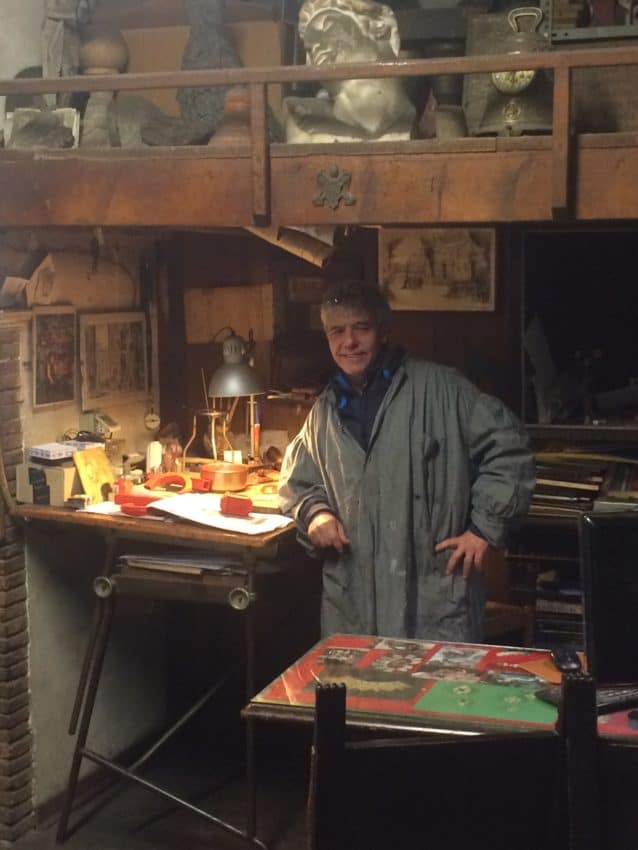
Anyone started Christmas shopping yet? I’m done. I’m almost always done by early December. I don’t waste time. I don’t bull rush shopping in one harried night in a mall. I shop all year. Wherever I go around the world I find something for my family in the States. In fact, I bought my first present for this Christmas on Jan. 1. This year my family is getting, in the mail, gifts from Thailand, Laos, Sweden and France as well as Italy.
Too bad. Only 1 ½ miles from my home in Rome I found a place that truly would provide a unique gift. Historical, too. Bottega Mortet is home to a family of artisans who have carried on a tradition that long ago nearly disappeared. In the early 20th century, the area between Piazza Navona and the Tiber River was chock-a-block with little shops specializing in gold and silver art objects. These artists rubbed elbows and dust with carpenters, cobblers and tailors.
Carpenters, cobblers and tailors can still be found all over Rome. Gold and silver artisans? They’ve gone the way of the horse and buggy. But like the one or two horse and buggies that clop through my Testaccio neighborhood to cart tourists around nearby Centro Storico, some gold and silver artisans remain. They’re just not for tourists. They have a market ranging from learned art collectors to the Vatican.
From a marketing standpoint, Bottega Mortet may as well be underground. I found the shop after 30 minutes roaming the narrow roads and twisting alleys north of Piazza Navona. Today the neighborhood is lined with carpet shops, small outdoor cafes and souvenir stores, all anchored by the 18th century Palazzo Sant’Agostino. I had to ask a cafe coffee jockey for directions. He pointed down the street to a large tower that looked torn off a castle somewhere. In the adjacent building I walked through a cutout door no more than 5 ½ feet high into Palazzo Scapucci, built in 1444 for the powerful Frangipani family.
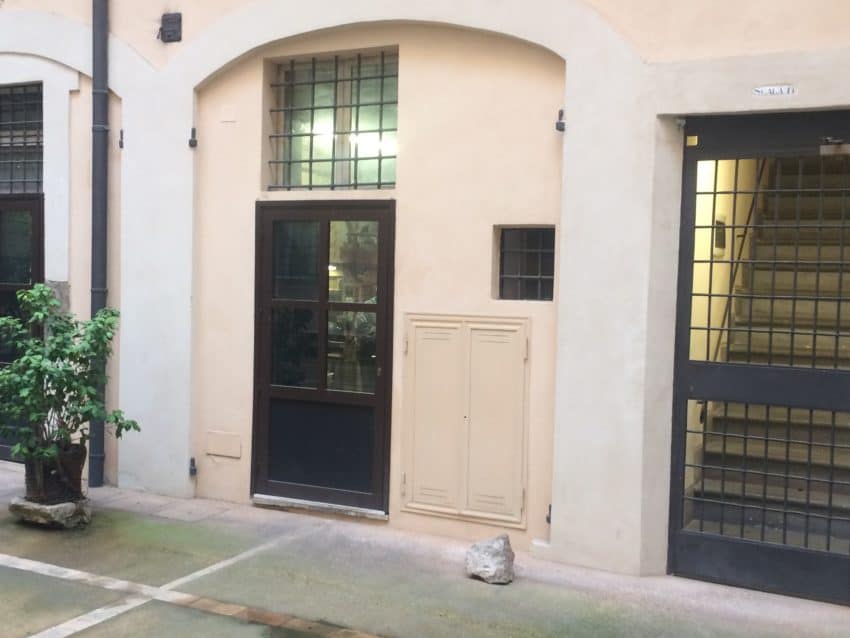
I found myself in a quiet courtyard with various doors. Not a single one had a sign. A tall man wearing a moustache and a dusty black apron stood outside one door talking on his cell.
“Dove Bottega Mortet?” I asked.
He pointed to his door. I entered and saw sitting on a stool in a dark corner Paolo Pugelli. Wearing a long gray smock, he was looking under a small spotlight at a table filled with little red art objects. Above him was a small loft holding busts of ancient sculptures. Maybe this is where all the heads of headless statues I see in Rome museums end up.
Pugelli is 62 years old and has been a fine metals artist since he was 14. He is the cousin to the Mortet family, of whom Andrea was busy in an adjacent room equally cluttered. Dante Mortet had just left. I walked along an ancient wood floor past stacks of dusty books crammed in a chimney space. An old glass case held a replica soccer World Cup trophy, gold figurines and gold coins.
It’s as far from the high-end art shops along tony, ivy-lined Via Margutta as you can find but they are no less valuable.
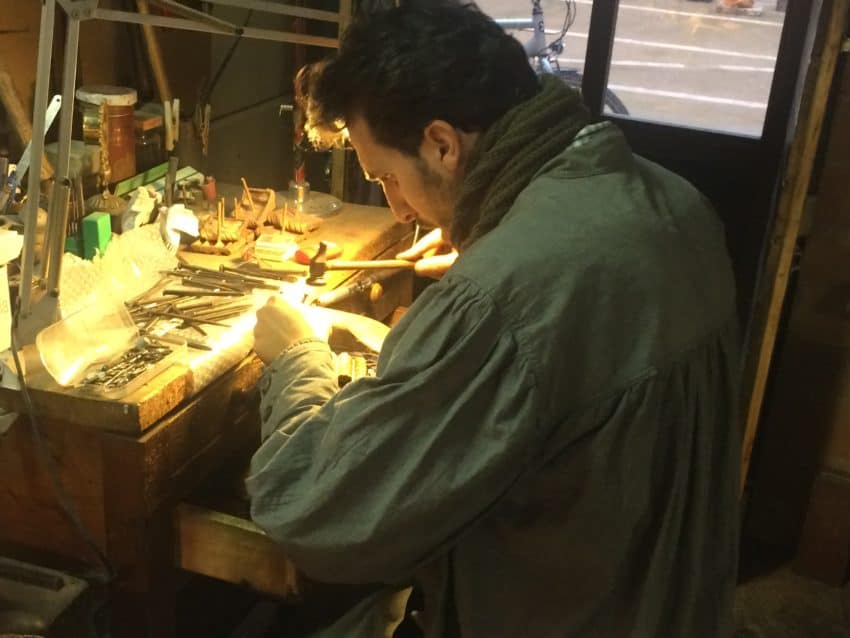
Bottega Mortet is not a store. Bottega means “workshop” in Italian. It started in the early-1950s, bridging a gap between a dying Italian art and the modern consumer. Michele and Andrea are sons of Aurelio Mortet, who started the business. Another Mortet has a store outside of Rome.
While Michele took little hammers and chisels to little gold objects, I asked Paolo why this charming place is one of a dying breed.
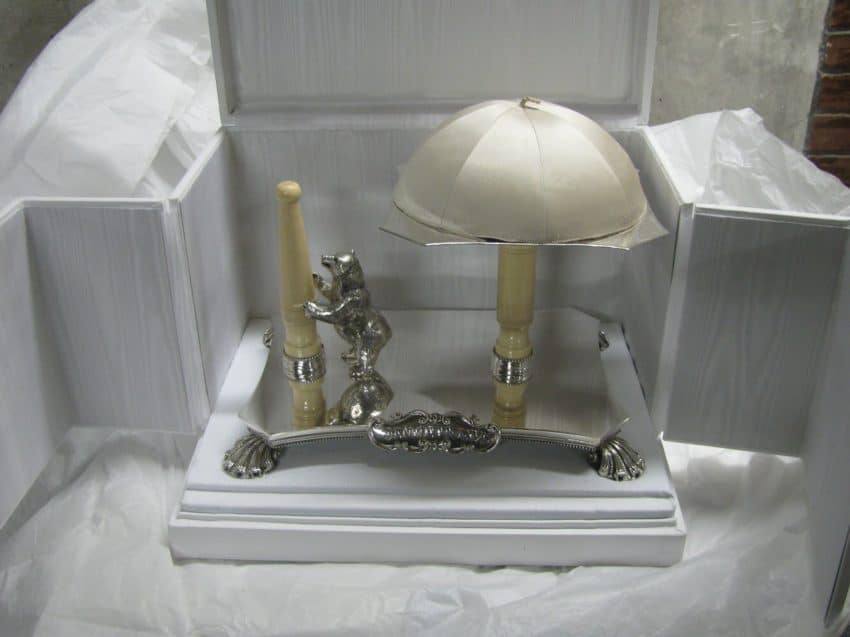
“It’s true that many things changed in this work,” he said. “Also the taste of people changed. The entire society changed. How could I say, the way of interpreting beauty and art changed. Once upon a time, people wanted a special, particular object and they used to go to artisans. Nowadays people often prefer to buy name-brand objects.”
That means malls, touristy stores along Via del Corso, lobbies of five-star hotels. How boring.
Anyone can come into the shop and look around. However, the shop runs almost entirely on individual commissions. People get an idea of what they want and discuss it with one of the family members. They put their heads together and come up with an idea. The family has a good reputation, at least according to one customer.
Pope Benedict XVI.
When he reigned across the river in Vatican City from 2005-2013, Pope Benedict had a representative come down to the shop about six or seven years ago. They wanted a specially, handmade gold cross.

Paolo took out an old copy of L’Osservatore Romano, The Vatican’s daily newspaper founded in 1861. On the front page is Pope Benedict, the cross swinging conspicuously around his neck. The pope liked it so much, his office invited Paolo to come for a rare private audience with some professors.
“I answered that I thought it wouldn’t be right to go there,” he said. “I’m not a professor. There’s no sense because in your life you must be humble. I was very pleased but I’m already very happy that the pope was wearing my cross. That’s enough.”
For a man who has done his job for 48 of his 62 years, Paolo hasn’t lost any excitement for his craft. He has zest in his voice, a gleam in his eye. I asked him what he liked about his job.
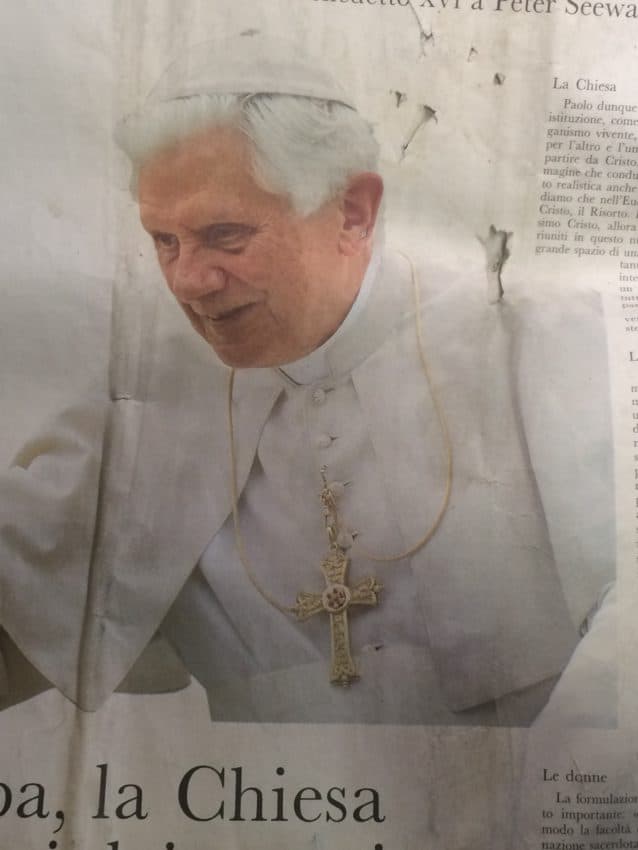
“I always loved design and art,” he said. “I am somebody who is so lucky to have found what I like to do. I think it’s everybody’s dream to have a job with passion. I always say that if you do your job with passion you are very lucky. To become rich, you must steal. Work must be made with passion and this is the richness.”
For anyone wanting a handmade gold, silver or bronze figurine and have an idea you always wanted to bring to fruition, you can contact Bottega Mortet at 39-06-686-1629 or bottega.mortet@fastwebnet.it.

